Table of contents
Click the links below to jump to different sections of the newsletter. To view a PDF version of the shorter print edition of the newsletter, click HERE.
If you wish to support PNHP’s outreach and education efforts with a financial contribution, click HERE.
If you have feedback about the newsletter, email info@pnhp.org.
PNHP News and Tools for Advocates
- PNHP Holds Messaging Training on Medicare Advantage
- Massachusetts Medical Society Passes Single-Payer Resolution
- PNHP Joins Be A Hero at DC Rally Against Corporate Profiteering in Medicare
- Meet Rebecca, Our New National Organizer
Come to Atlanta for PNHP’s Annual Meeting
Research Roundup
- Data Update: Health care crisis by the numbers
- Studies and analysis of interest to single-payer advocates
PNHP Chapter Reports
SNaHP Chapter Reports
- Florida State University
- Penn State
- University of Buffalo
- University of Minnesota-Twin Cities
- University of Missouri-Columbia
35th Anniversary House Parties
PNHP in the News
PNHP News and Tools for Advocates
PNHP Holds Messaging Training on Medicare Advantage
On August 24th, PNHP hosted a training for members and activists on how to talk about Medicare Advantage (MA) to different audiences. Drs. Ed Weisbart and Susan Rogers, as well as PNHP staff Dixon Galvez-Searle and Gaurav Kalwani, each gave an overview on the best tactics to use when speaking to physicians, members of the public, and policymakers about MA.
Below are some of the most important elements to consider in your own activism. These tips will be especially helpful when you are attempting to get people to fill out our beneficiary and physician surveys, sign our MA petition, and join PNHP.
For Physicians
- Connect with personal and patient stories: Regardless of their level of policy knowledge, physicians will resonate most with your own stories of how MA has brought harm to your patients or others.
- Focus on professional autonomy: Emphasize the ways in which MA prevents physicians from doing their jobs, by making them deal with prior authorization, claim denials, and other headaches. Make sure you name specific insurance companies as the culprit here.
For the General Public
- Qualify the term “Medicare Advantage”: While it’s best to be clear when using the term Medicare Advantage and avoid potentially turning someone off with terms like “Medicare Disadvantage,” you can emphasize the problems with the program by calling it something like “corporated-controlled Medicare Advantage” or “so-called Medicare Advantage.”
- Focus on “reclaiming” Medicare: Remind people that Medicare is their program, paid for by their tax dollars, which are currently being funneled into big insurance companies while undermining our beloved public insurance programs.
For Policymakers
- MA is radically changing Medicare: Remind them that Medicare was created to be a social insurance program, and that letting insurers take it over is a fundamental change to that model. Insurer “innovations” like narrow networks and prior authorization are contrary to the spirit of the program, lead to worse care outcomes, and have no place in Medicare.
- MA redirects public dollars to private hands: MA costs more than TM, and that money is going directly from taxpayers into corporate profits. This money was supposed to be spent on patient care, and it should be.
For Everyone
- Lead with shared values, not problems: You’ll have more success connecting with people by opening with easily agreeable statements. Data supports focus on family, community, fairness, and freedom, so use openings like: “Do you have a minute to talk about making sure seniors in our community get the best possible care?”
- Don’t shield the culprits from view: Insurance companies are not well-liked by anybody in this country, so it’s important to make them the face of Medicare Advantage, rather than the government. Make sure to specify the companies doing harm here, and show that they are the ones raiding the Medicare trust fund. Avoid using statements that imply the government is “broken”, which could make private alternatives seem more attractive.
- Focus on tangible patient harms: Have stories and data ready to go that show why narrow networks, surprise bills, and care delays/denials are harmful and even fatal to patients. Explain how traditional Medicare does not have these problems, and why private insurance always will.
- Inspire hope: Don’t exclusively go negative, because we want people to believe that things can change. Talk about the improvements we want to see in Medicare, and the future we’re fighting for.
Find more materials on Medicare Advantage in our latest Kitchen Table Campaign toolkit, and at ProtectMedicare.net.
Massachusetts Medical Society Passes Single-Payer Resolution
Following many months of intense and dedicated organizing by PNHP members and allies in the state, the Massachusetts Medical Society (MMS) House of Delegates passed a resolution stating:
“That the MMS supports and will advocate for universal access to equitable, comprehensive, affordable, high-quality, administratively streamlined health care through a national health program, as well as through legislation at the state level, and will continue to explore and evaluate payment structures that may be able to achieve these goals.”
This exciting development in Massachusetts offers inspiration and several useful lessons for members to apply in their own efforts to pass single-payer resolutions in various regional and specialty-based medical societies.
Dr. C. Frazer Shipman, a member of PNHP for 30 years, helped lead this campaign from the beginning. The effort began at the district-level, with a resolution based on one of PNHP’s sample resolutions receiving positive feedback in the Franklin District Medical Society, and from there making its way to the full state House of Delegates in 2022. Over the next year, the resolution team recruited many PNHP members who were also part of the MMS to testify in support of the resolution. Because of these efforts, testimonies were 3-to-1 in favor of single payer.
“I used PNHP data and their sample resolution to work with members of my local district,” said Dr. Shipman. “Many Mass physicians and Medicare for All advocates worked hard to pass the wording quoted above, including the Berkshire and Hampshire Districts, PNHP National, the Boston PNHP Chapter, and Mass-Care.”
By working together with like-minded allies, understanding the environment of their medical society, and planning an extensive campaign of recruitment and engagement, these physicians and advocates were able to push Massachusetts health care in a more progressive direction.
If you would like to do the same in your local medical society, please reach out to our national organizer, Lori Clark, at lori@pnhp.org to discuss beginning your own resolution campaign.
PNHP Joins Be A Hero at DC Rally Against Corporate Profiteering in Medicare
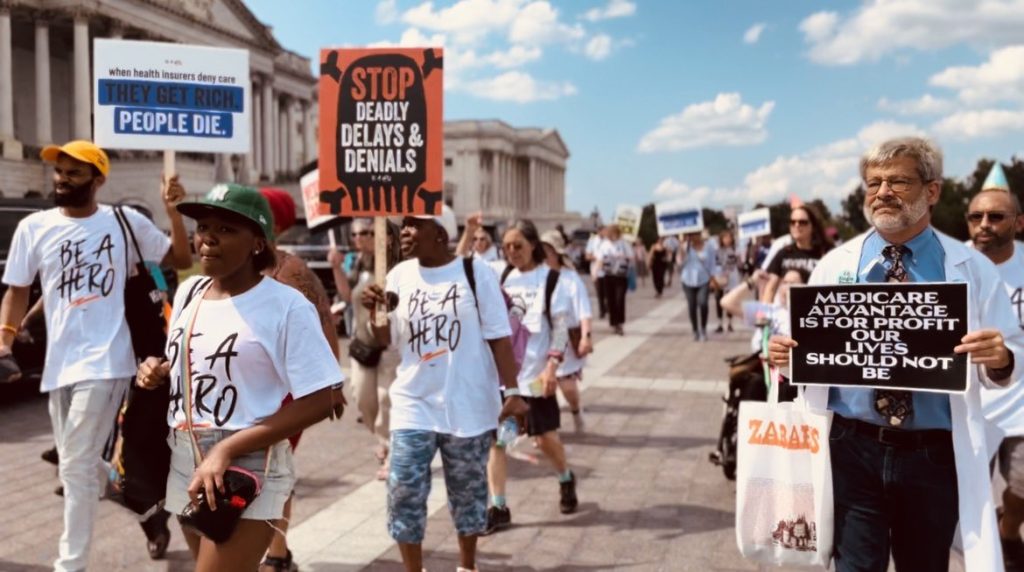
On July 25th, PNHP joined with Be a Hero and other organizational allies as well as members of Congress like Senator Elizabeth Warren (D-MA), Rep. Mark Pocan (D-WI), and Rep. Barbara Lee (D-CA) to rally against corporate raiding of taxpayer dollars through the Medicare Advantage program.
Members of Congress and advocates alike spoke about the myriad issues with Medicare Advantage, told personal stories of loved ones who were harmed by the greed of the insurance industry, and demanded a true solution to the health care woes of this country that would provide coverage to each and every person.
Introducing Rep. Lee, PNHP’s own Dr. Steve Auerbach stated the problem succinctly. “Denials and delays and narrow networks are killing Americans every day,” he said. “The leeches of private insurance are sucking out taxpayer dollars that should be going to patient care. Medicare Disadvantage is bad for patients, doctors, and hospitals.”
Several members of Congress pointed to issues in prior authorization, upcoding, and other abuses that give away money to corporate insurers while leading to worse care for seniors and people with disabilities.
“It is time to crack down on these abuses,” said Senator Warren. “Instead of giving away extra money to private insurance companies, we can strengthen traditional Medicare.”
The rally was followed by a day of lobbying, wherein advocates visited various Congressional offices to speak with their elected officials on the need to crack down on the corrupt and corporate-controlled Medicare Advantage program.
Meet Rebecca, Our New National Organizer
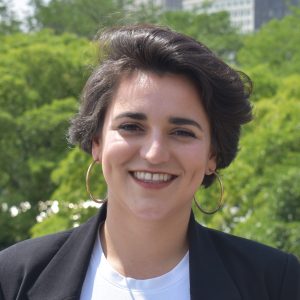
Previous Experience: I am a recent Master’s in Public Policy graduate with a certificate in health policy. The scope of my experience ranges from Congressional intern to lobbying with Planned Parenthood and publishing research in The Contraception Journal.
What drew you to PNHP? Throughout my career, I have been trying to find the bridge between my interests in health and medicine, with the world of politics. PNHP provided me the outlet to use my health policy background to pursue my personal activism goals.
What are you looking forward to working on over the next 12 months? I am excited to bring a rejuvenated enthusiasm to the PNHP team and network. I also look forward to creating partnerships within the single-payer movement with other social justice organizations.
What’s a fun fact about yourself? I am a dedicated sports fan, originally from Oakland, CA. Go Raiders!
Come to Atlanta for PNHP’s Annual Meeting and 35th Anniversary celebration

PNHP’s 2023 Annual Meeting and Leadership Training, along with the 2023 SNaHP Summit, will be held Nov. 10-12 in Atlanta. We will celebrate 35 years since PNHP’s incorporation, strategize for the path to achieving Medicare for All, and hear from our keynote speaker, Dr. Camara Jones.
Camara P. Jones, M.D., M.P.H., Ph.D., is a family physician, epidemiologist, and past president of the American Public Health Association whose work focuses on naming, measuring, and addressing the impacts of racism on the health and wellbeing of the United States and the world.
When planning your travel, don’t forget to join us for PNHP’s 35th Anniversary celebration dinner on Saturday, Nov. 11, and stay for a public action on Sunday, Nov. 12. More event details (including hotel booking information and meeting registration) can be found at pnhp.org/meeting.
You can send a student to the 2023 SNaHP Summit, being held in Atlanta in conjunction with PNHP’s Annual Meeting, by making a gift to the Nick Skala Student Activist Fund. Use the card enclosed with this newsletter or go to pnhp.org/SkalaFund to support the future of our movement.
Research Roundup
Data Update: Health Care Crisis by the Numbers
Barriers to Care
At least 1.7 million Americans rely on health sharing plans: Data from 16 sharing plans provided the first national count of the number of Americans relying on these schemes, which arrange for people to pay one another’s medical bills. At least 11 of the plans operated in or advertised in all 50 states; these plans are usually organized around people with common religious beliefs. Because sharing plans are not held to the same consumer protections and regulations as insurance plans, costs can easily spiral out of control. Markian Hawryluk, “At Least 1.7M Americans Use Health Sharing Arrangements, Despite Lack of Protections,” KFF Health News, 6/14/23.
Majority of insured adults experience problem using health coverage: 58% say they have experienced a problem using their insurance in the past 12 months–these include denied claims, network issues, and pre-authorization issues. Adults in fair or poor health as opposed to good health were more likely to experience problems, with 67% of these adults reporting an issue. Among the 58% who had problems, 17% were unable to receive recommended care as a result. 15% experienced a decline in their health, and 28% said they paid more than they expected for care. Pollitz et al., “KFF Survey of Consumer Experiences with Health Insurance,” KFF, 6/15/23.
Data on denials is shrouded in mystery: There is a serious lack of transparency around data on insurance claim denials. Limited government data suggests insurers deny between 10% and 20% of claims, but these are only aggregated numbers and do not explore differences in types of care or insurance. 85% of people with insurance say they want regulators to compel insurers to disclose how often they deny claims. Robin Fields, “How Often Do Health Insurers Say No to Patients? No One Knows,” ProPublica, 6/28/23.
Hospital consolidation leads to inpatient pediatric service closures: A study in JAMA Pediatrics found that inpatient pediatric services had decreased across the study period, going from being offered at 41.5% of 4,876 hospitals in 2011 to 32.6% of 4,551 hospitals in 2020. Of 1,088 hospitals further studied, 235 joined a larger health system during the study period. Joining a larger health system was significantly associated with a loss of inpatient pediatric services within five years. Dave Muoio, “Hospital consolidation followed by inpatient pediatric service closures, study finds,” Fierce Healthcare, 6/6/23.
Healthcare costs projected to grow 7% in 2024: Factors accounting for this increase include providers dealing with higher expenses and seeking rate increases during contract negotiations with insurers. The projection, made by consultants at PricewaterhouseCoopers, tops previous estimates in 2022 and 2023, which were 5.5% and 6%, respectively. To create these estimates, the consultancy spoke with actuaries who work with insurers covering 100 million employer-sponsored members and 10 million Affordable Care Act members to forecast healthcare inflation. Results were weighted by each health plan’s size. Alex Kacik, “Healthcare costs to grow 7% next year: PwC,” Modern Healthcare, 6/29/23.
Patients with Parkinson’s disease face barriers seeing a neurologist: An estimated 90% of people living with Parkinson’s disease (PD) in the U.S. are covered by Medicare. PD beneficiaries number 685,116, or 1.2% of the total Medicare population. Compared to the overall Medicare population, 56.3% are male (vs 45.6%), 77.9% over age 70 (vs 57.1%), 14.7% people of color (vs 20.7%), and 16.0% are rural residents (vs 17.5%). 40% of PD beneficiaries did not see a neurologist at all during the calendar year, and only 9.1% visited a movement disorder specialist. Few beneficiaries diagnosed with PD use recommended services such as physical, occupational, or speech therapy. People of color and rural residents were least likely to access a neurologist or therapy services. Despite 52.9% of beneficiaries being diagnosed with depression, only 1.8% had a clinical psychology visit. Pearson et al., “Care access and utilization among Medicare beneficiaries living with Parkinson’s disease,” NPJ Parkinson’s Disease, 7/10/23.
Youth face issues accessing opioid addiction medication: From 2015 to 2020, the proportion of buprenorphine prescriptions dispensed for youths age 12-19 decreased for commercial insurance from 29.8% to 22.9%, for self-pay from 13.2% to 7.6%, and for assistance from 18.2% to 8.9%. While total prescriptions dispensed decreased 17.5%, the proportion of prescriptions paid by Medicaid, the payer with the greatest share of prescriptions in 2020, increased from 27.1% to 44.3%. In the South, prescriptions had higher out of pocket costs, a higher proportion were paid by self-pay and assistance, and a lower proportion were paid by Medicaid. Prescriptions in rural counties followed similar patterns to the South. Terranella et al., “Out-of-Pocket Costs and Payer Types for Buprenorphine Among US Youth Aged 12 to 19 Years,” JAMA Pediatrics, 8/7/23.
Price of elder care continues to increase: Fueled by increases in the elderly population, the price of nursing home care increased by an average of 2.4% each year between 2012 and 2019, for a cumulative increase of 20.7%. In 2021, the median cost to stay in a private room in a nursing home in the U.S. is $9,034 per month. The median cost to stay in a semi-private room in a nursing home was $7,908 a month, and the median cost to stay in an assisted living facility was $4,500 per month. Alejandra O’Connell-Domenech, “Price of elder care soars as demand increases, baby boomers age,” The Hill, 8/13/23.
Medicare & Medicaid Issues
Medicaid disenrollments continue: As of August 24, at least 5.4 million Americans have lost their Medicaid coverage. Disenrollment rates vary from 72% in Texas to 8% in Wyoming. Across all states, 74% of people have lost coverage for procedural reasons rather than changing eligibility. In the 15 states reporting age breakouts, more than 40% of disenrollments were of children. KFF, “Medicaid Enrollment and Unwinding Tracker,” 8/24/23.
Crowdfunding is only hope for many diabetes patients: A study examining 313 crowdfunding campaigns found that the median goal for campaigns was $10,000, and only 14% of campaigns reached their goal, though with a median of $2,600 raised. 27% of people said they had insurance, but nearly all said their out of pocket costs were too high or coverage was too sparse. 6% requested money specifically for insulin, 10% requested money for insulin pumps, and 6% requested money for a continuous glucose monitor. Kristen Monaco, “When Insurance Doesn’t Cut It, Diabetes Patients, Turn To Crowdfunding,” MedPage Today, 6/7/23.
Medicare Advantage Payments higher than previously estimated: MedPAC has estimated annual overpayments in Medicare Advantage to be about 6% of $27 billion. A new study estimates that, because of the impact of “favorable selection,” this amount is actually closer to more than 20% or $75 billion annually. Adriel Bettelheim, “Medicare Advantage overpayments higher than estimated: study,” Axios, 6/14/23.
Medicare Advantage quality bonus program has questionable benefits: Combined, United Healthcare and Humana received $4.7 billion in bonuses for their MA plans last year. Issues in star rating calculation, difficulty in measuring quality, and rating inflation contribute to a system where payments do not reflect actual quality of care. In 2014, the average star rating across Medicare Advantage contracts was 3.86, compared with 4.15 in 2023. Mari Devereaux, “Medicare Advantage quality bonus program needs reform: Urban Institute,” Modern Healthcare, 7/6/23.
Medicare Advantage insurer pays largest fraud settlement in Maine state history: Martin’s Point Health Care Inc. will pay almost $22.5 million to resolve allegations of submitting inaccurate codes for MA enrollees to increase Medicare payments. The company was accused of submitting inaccurate diagnosis codes for enrollees in Maine and New Hampshire between 2016 and 2019. The allegations against the provider originated from a whistleblower complaint; the whistleblower will receive a portion of the settlement, around $3.8 million. AP, “Health care provider to pay largest Medicare fraud settlement in Maine history,” 7/31/23.
CMS sets higher payment hikes for hospitals: Inpatient hospitals will receive a higher rise in payments from CMS than initially proposed. Acute care hospitals in compliance with various guidelines will receive a 3.1% net increase in Medicare payments in fiscal 2024, an increase from the original hike of 2.8% proposed in April. CMS also set a 0.2% reimbursement increase for long-term care hospitals. Lauren Berryman, “CMS sets pay hikes for inpatient, long-term care hospitals,” Modern Healthcare, 8/1/23.
Georgia Medicaid work program off to slow start: Despite projections from the Georgia Department of Community Health that indicated up to 100,000 people could benefit from Georgia’s Medicaid work program, known as Pathways to Coverage, just 265 applications had been approved by August of this year. At the same time, Georgia has cut more than 170,000 adults and children from Medicaid as it continues its review of the 2.7 million Medicaid recipients in the state. Sudhin Thanawala, “Georgia Medicaid program with work requirement off to slow start even as thousands lose coverage,” AP, 8/19/23.
Pharma
Severe shortages in cancer drugs: A survey of cancer centers revealed that 93% of centers are experiencing a shortage of carboplatin, and 73% are experiencing a shortage of cisplatin. These medications are used to treat a wide variety of cancers, including lung, breast, prostate, and gynecologic cancers, as well as lymphomas and leukemias. Only 64% of centers reported being able to keep all patients on a carboplatin regimen without delays or claim denials. National Comprehensive Cancer Care Network, “NCCN Releases Statement Addressing Ongoing Chemotherapy Shortages; Shares Survey Results Finding More than 90% of Cancer Centers are Impacted,” 6/7/23.
Large drug distributor sued by tribe over opioid crisis: A lawsuit was filed by the Cherokee Nation on behalf of the entire 400,000-citizen tribe in Oklahoma state court, alleging negligence on the part of the distributor, Morris & Dickson. The suit states that between 2010 and 2014, the distributor shipped more than 3.7 million pills to just five pharmacies in counties populated by tribal members. More than 5,200 people died of drug overdoses in Oklahoma from 2014 to 2020. David Ovalle, “Opioid distributor, already facing license revocation, sued by tribe,” Washington Post, 6/8/23.
Drug and supply chain burdens plague health systems: Large health systems are seeing shortages of upwards of 600 products and 200-300 drugs a month. Providers are 2.5 times more likely to experience shortages on products in markets that have two or fewer manufacturers accounting for more than 80% of market share. Nearly half of respondents (48.6%) to a survey of health and supply chain officials said they had to cancel or reschedule cases or procedures at least quarterly in 2022 due to product shortages. Adriel Bettelheim, “Health systems plagued by spot shortages scramble for essentials,” Axios, 6/29/23.
$2.9 million gene therapy for severe hemophilia approved by FDA: Roctavian was approved for adult patients with severe cases of hemophilia A. Approval was based on a three-year study showing a 50% reduction in annual bleeding incidents among 134 patients who received the treatment. Traditional infusions for this condition cost about $800,000 annually for a typical patient. The maker estimates about 2,500 U.S. patients will be eligible to receive the therapy under the terms of the FDA’s approval. Last year, Hemgenix, a similar gene therapy for hemophilia B, was approved and became the most expensive drug of all time at $3.5 million. Matthew Perrone, “$2.9 million gene therapy for severe hemophilia is approved by FDA,” AP, 6/29/23.
Nevada reaches $1 billion in total opioid settlements: Nevada reached a $285 million settlement with Walgreens regarding the chain’s role in the opioid epidemic. Nevada’s total anticipated payments from opioid claims now amount to $1.1 billion. Most recently, the state reached a $193 million agreement with Teva Pharmaceuticals in June and a $152 million deal with CVS in May. AP, “Nevada secures $285M opioid settlement with Walgreens, bringing total settlements to $1 billion,” 7/5/23.
5 largest pharma firms earned $81.9 billion last year: The combined stock buybacks and dividends of the companies increased by $4.4 billion and $2.5 billion, respectively, from 2021 to 2022. Pfizer’s net income was over $31.4 billion during fiscal 2022, a 42.5% increase from 2021. Shareholders of Pfizer received more than $10.9 billion in stock dividends and buybacks. Last year, Merck’s net income was over $14.5 billion, and more than $7 billion was spent on shareholder dividends. Taylor Giorno, “Top 5 largest US pharma firms’ net earnings topped $81.9 billion last year: watchdog,” The Hill, 7/24/23.
Uninsured patients paying up to $330 for Eli Lilly’s insulin: Despite the company’s pledge to cut its list price for its insulin to $25 per vial, a survey of more than 300 pharmacies across all 50 states by Senator Elizabeth Warren’s office found that uninsured patients paid an average of $98 for the drug. A third of drug stores charged $164 or more for the company’s insulin, with the highest-priced pharmacy charging $330. Chain stores charged uninsured patients an average of $123 per vial, compared to $63 at independent pharmacies. Patrick Wingrove, “Uninsured US patients pay up to $330 for Eli Lilly’s $25 insulin, Senator Warren says,” Reuters, 7/13/23.
Health Inequities
Burden of obesity falls on marginalized groups: Non-Hispanic Black adults have the highest obesity rates of any racial group–four out of five Black women have obesity. Approximately 45.6% of Hispanic adults are living with obesity as well. The prevalence of obesity is six times higher in rural America compared to urban America, and poverty is strongly correlated with obesity. Despite this, coverage is limited, and less than 2% of those eligible for anti-obesity medications are prescribed them. Health Equity Coalition for Chronic Disease, “Advancing Equity: The Urgent Need to Confront Disparities in Obesity,” June 2023.
OBGYNs say effects of Dobbs decision overwhelmingly negative: 68% of 569 board-certified OBGYNs surveyed say the effects of the decision have made the management of pregnancy-related emergencies worse, while 64% say the ruling has worsened pregnancy-related mortality. 70% believe that the decision has widened racial and ethnic inequities in maternal health care. 61% of OBGYNs practicing in states where abortion is banned are worried about their own legal risk when making decisions on patient care. Kim Bellware and Emily Guskin, “Effects of Dobbs on maternal health care overwhelmingly negative, survey shows,” Washington Post, 6/21/23.
Black, rural, southern women most in need of maternal care assistance aren’t getting it: Not one site funded by a federal program created to improve rural maternity care is located in the Southeast, which has the largest concentration of predominantly Black rural communities. Among the initial 2019 grant awardees, the awardee in Texas reported that 91% of people it served were Hispanic. New Mexico’s awardee reported that 59% of recipients were Hispanic, and Missouri reported that 22% of beneficiaries were Black. In all cases, the majority were Medicaid enrollees. Sarah Jane Tribble, “Black, Rural Southern Women at Gravest Risk From Pregnancy Miss Out on Maternal Health Aid,” KFF Health News, 6/22/23.
Transgender individuals face higher suicide rates: A study of individuals in Denmark found that transgender individuals had a rate of suicide attempts 7.7 times higher than nontransgender individuals. The study also found that transgender individuals have a 3.5 times higher suicide mortality and a 1.9 times higher suicide-unrelated mortality Suicide attempt rates per 100,000 person–years were 498 for transgender individuals and 71 for nontransgender individuals. Erlangsen et al., “Transgender Identity and Suicide Attempts and Mortality in Denmark,” JAMA, 6/27/23.
State-level maternal mortality rates are higher for Black and Native individuals: In 2019, maternal mortality rates in most states were higher among American Indian and Alaska Native and Black populations than among Asian, Native Hawaiian, or Other Pacific Islander; Hispanic; and White populations. Between 1999 and 2019, observed median state mortality rates increased from 14 to 49.2 among the American Indian and Alaska Native population, 26.7 to 55.4 among the Black population, 9.6 to 20.9 among the Asian, Native Hawaiian, or Other Pacific Islander population, 9.6 to 19.1 among the Hispanic population, and 9.4 to 26.3 among the White population. In each year between 1999 and 2019, the Black population had the highest median state maternal mortality rate. Fleszar et al., “Trends in State-Level Maternal Mortality by Racial and Ethnic Group in the United States,” JAMA, 7/3/23.
Rural Americans struggle to afford health care: As compared with similarly high-income nations, rural Americans have a harder time affording medical care and are more likely to skip care because of costs. 22.8% of rural Americans have had serious problems paying or were unable to pay medical bills, compared to 8.9% of rural Australians and 6.5% of rural Canadians. Similarly, 36% of rural Americans skipped needed care due to costs, compared with 14.4% of rural Canadians and 11.3% of rural French. Munira Z. Gunja, “Rural Americans Struggle with Medical Bills and Health Care Affordability,” The Commonwealth Fund, 7/24/23.
Hispanic families kept out of Medicaid by poor administration: Reaching someone at Florida Medicaid’s call center took an average of two and a half hours for Spanish speakers, compared with 36 minutes for English speakers. The longest delay experienced for an English speaker in the study was just 50 minutes, far shorter than the average wait for Spanish speakers. Almost a third (30%) of all Spanish calls were disconnected before the caller reached a human being; by contrast, only 10% of English calls were dropped. UnidosUS, “At Florida’s Medicaid call center, long and discriminatory delays prevent eligible families from keeping their health care,” 8/17/23.
Profiteers in Health Care
California hospitals ask for bailout despite billions in profits: The California Hospital Association has requested a $1.5 billion bailout from the state government, despite the hospital industry taking in $9.2 billion in patient revenue in 2021. One of the country’s richest hospitals, Cedars-Sinai Health System in Los Angeles, received a $28 million grant from a charity that collects money from other hospitals, many of which serve California’s poorest residents. Samantha Young and Angela Hart, “California Hospitals Seek a Broad Bailout, but They Don’t All Need It,” KFF Health News, 5/5/23.
Class action lawsuit against Aetna and Optum proceeds: A judge for the U.S. District Court for the Western District of North Carolina certified the class-action lawsuit, which includes more than 87,700 people and nearly 2,000 health plans. The suit alleges that Aetna and Optum used misleading billing practices, developing “dummy code” that was intended to bury fees and pass off administrative fees as medical expenses. The initial plaintiff sued in 2015 after her cost for physical therapy doubled under an Aetna plan. Nona Tepper, “Aetna, Optum to face revived ‘dummy code’ lawsuit,” Modern Healthcare, 6/7/23.
Fraudsters trick poor and homeless people into signing up for unaffordable ACA plans: The federal agency overseeing the marketplace said that for the fiscal year ending September 30, 2022, the agency received more than 25,000 complaints from people saying that they had been enrolled in policies without their consent or that incorrect information was submitted for them by an agent or broker. CMS said it performed more than 700 license verifications because of these issues during the same period. Daniel Chang, “Fraudsters Are Duping Homeless People Into Signing Up for ACA Plans They Can’t Afford,” KFF Health News, 6/13/23.
Nonprofit hospitals collect public money while exacerbating debt: 41% of adults in the U.S. have some form of medical debt, and 73% of adults with past-due medical debt report owing at least some of that debt to hospitals. Nearly 60% of community hospitals in the country are privately operated nonprofits, and while these nonprofit hospitals received $28 billion in tax benefits in 2020, they only spent about $16 billion on free or reduced-price charity care. The median nonprofit hospital only spends 1.5% of hospital expenses on charity care. Brian Stauffer, “In Sheep’s Clothing: United States’ Poorly Regulated Nonprofit Hospitals Undermine Health Care Access,” Human Rights Watch, 6/15/23.
Physician-owned hospitals have lower costs: An analysis of around 1,100 non-physician owned hospitals and 150 physician-owned hospitals found that prices negotiated between hospitals and commercial insurers for eight common procedures were 33.7% lower at physician-owned hospitals compared with non-physician owned hospitals. This could potentially be due to the fact that physician-owned hospitals treat fewer Medicaid patients and provide less charity care, although these factors were controlled for in the study. Wang et al., “Comparison of Commercial Negotiated Price and Cash Price Between Physician-Owned Hospitals and Other Hospitals in the Same Hospital Referral Region,” JAMA Network Open, 6/23/23.
Private equity grows in anesthesiology and emergency medicine: From 2009 to 2019, physician groups owned by private equity or publicly traded companies grew from 3.2% and 8.6% of the national anesthesia and emergency medicine markets, respectively, to 18.8% and 22.0%. Over the same period, the five largest independent anesthesia practices and five of the six largest independent emergency medicine practices were acquired by private equity or publicly traded companies. Also during this period, the share of the population living in a highly concentrated anesthesia market increased from 16.8% to 34.4%. Adler et al., “Measuring private equity penetration and consolidation in emergency medicine and anesthesiology,” Health Affairs Scholar, July 2023.
Biden administration takes aim at facility fees: The Biden administration announced a plan to mandate transparency in facility fees, which are charged by hospitals when they provide services in an outpatient location. In 2022, a 15-minute doctor visit in a hospital-owned clinic cost Medicare $189, of which facility fees accounted for $121 of the charge. The same visit cost $92 in a freestanding doctor’s office. Between 2004 and 2021, facility fees in emergency departments rose by 531%. Annalisa Merelli, “New Biden initiative targets controversial hospital ‘facility fees’ that often surprise patients,” STAT News, 7/7/23.
Health CEOs made more than $4 billion last year: The CEOs of more than 300 publicly traded health care companies made a combined $4 billion in 2022. This number is actually an 11% decrease from the $4.5 billion CEOs made in 2021. The 10 highest-paid CEOs made a collective $1.4 billion. The average health CEO salary for 2022 was $13 million. The median bonus payment for these CEOs was around $700,000. Once again, the highest-paid CEO overall was Moderna’s Stéphane Bancel, who took in $398 million. Herman et al., “Health care CEOs hauled in $4 billion last year as inflation pinched workers, analysis shows,” STAT News, 8/17/23
Studies and analysis of interest to single-payer advocates
“Alleviating Medical Debt in the United States,” by Nishant Uppal, M.D., M.B.A.; Steffie Woolhandler, M.D., M.P.H.; and David U. Himmelstein, M.D., New England Journal of Medicine, 9/7/23. “The persistence of medical debt and low levels of charity care at nonprofit hospitals (despite the financial assistance mandate in the Affordable Care Act) indicate that more muscular policies are needed.”
“How Health Insurers and Brokers Are Marketing Medicare,” Jeannie Fuglesten Biniek; Alex Cottrill; Nolan Sroczynski; Meredith Freed; Tricia Neuman; Breeze Floyd; Laura Baum; and Erika Franklin Fowler, KFF, 9/15/23. “TV ads for Medicare Advantage often showed images of a government-issued Medicare card or urged viewers to call a ‘Medicare’ hotline other than the official 1-800-Medicare hotline. More than a quarter of all airings (27%) included a government-issued Medicare card or image that resembled it, including 28% of insurer-sponsored airings and 21% of airings sponsored by brokers and other third-party entities, a trend that CMS has flagged as potentially misleading to beneficiaries. Roughly 16% of airings featured a privately-run phone line described as a ‘Medicare’ hotline, most of which were sponsored by brokers and other third-party entities.”
“Medicare’s Affordability Problem: A Look at the Cost Burdens Faced by Older Enrollees,” by Faith Leonard; Gretchen Jacobson; Sara R. Collins; Arnav Shah; and Lauren A. Haynes, Commonwealth Fund, 9/19/23. “The likelihood of having problems paying medical bills or debt was significantly higher for older adults with Medicare Advantage than those with traditional Medicare. Differences in the percent with medical bill or debt problems were significant among those with income between 200 percent and 399 percent of FPL and not statistically significant for those with higher or lower incomes.”
“Our Payments, Their Profits: Quantifying Overpayments in the Medicare Advantage Program,” by Physicians for a National Health Program, October 2023. “By our estimate, and based on 2022 spending, Medicare Advantage overcharges taxpayers by a minimum of 22% or $88 billion per year, and potentially by up to 35% or $140 billion. By comparison, Part B premiums in 2022 totaled approximately $131 billion, and overall federal spending on Part D drug benefits cost approximately $126 billion. Either of these—or other crucial aspects of Medicare and Medicaid—could be funded entirely by eliminating overcharges in the Medicare Advantage program.”
“Tiny, Rural Hospitals Feel the Pinch as Medicare Advantage Plans Grow,” by Sarah Jane Tribble, KFF Health News, 10/23/23. “Medicare Advantage growth has had an outsize impact on the finances of small, rural hospitals that Medicare has designated as ‘critical access.’ Under the designation, government-administered Medicare pays extra to those hospitals to compensate for low patient volumes. Medicare Advantage plans, on the other hand, offer negotiated rates that hospital operators say often don’t match those of traditional Medicare.”
PNHP Chapter Reports
Georgia
In Georgia, members held a 35th anniversary social and fundraiser, attracting over 40 attendees and raising just over $2000. The chapter also hosted the Atlanta premiere of “American Hospitals,” as well as a Universal Health Care Symposium at Grady Memorial Hospital.
To get involved in Georgia, please contact Dr. Elizabeth McCord at eomccord@gmail.com.
New Hampshire
In New Hampshire, members of Granite State PNHP hosted two public screenings of the film “American Hospitals,” and held post-film panel and discussion sessions. The chapter is also currently planning a campaign to have the New Hampshire Medical Society pass a resolution endorsing a “Simplified Public Payer System.” Finally, members will gather at the Dartmouth-Hitchcock Academic Center for a PNHP membership meeting this fall.
To get involved in New Hampshire, please contact Donald Kollisch at Donald.o.kollisch@dartmouth.edu.
New York
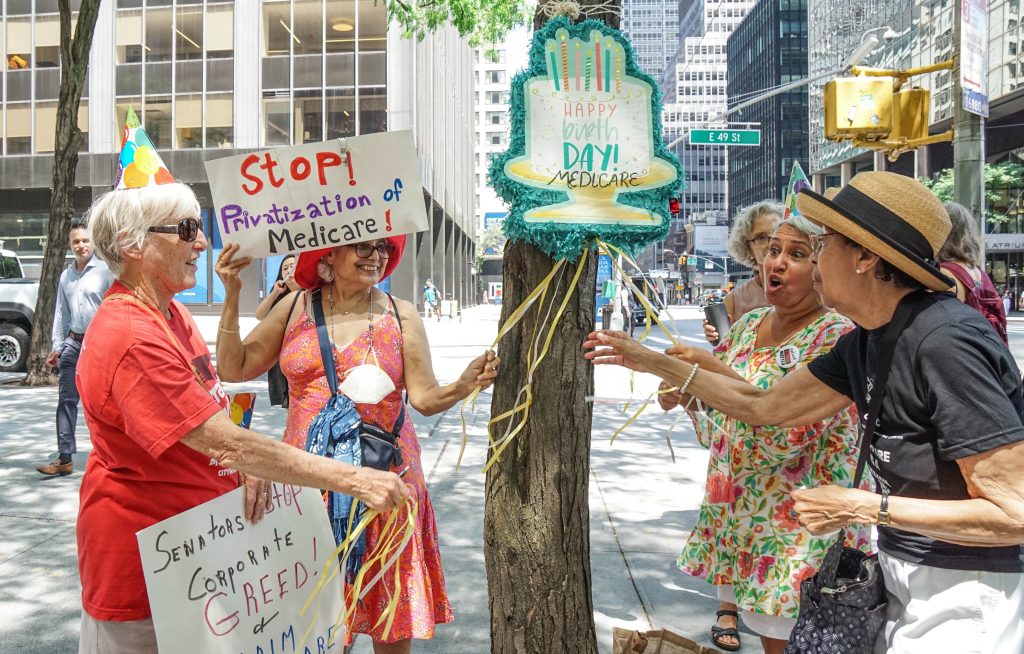
In New York, the PNHP NY-Metro chapter joined forces with local health justice advocacy groups, especially retiree groups opposing MA, to celebrate Medicare’s birthday outside Sens. Gillibrand and Schumer’s offices on July 28, 2023. With approximately 70 participants in attendance, activists celebrated with a piñata and cupcakes before attempting to deliver two oversized birthday cards to the legislative offices. This summer, the chapter also had its first in-person fundraising reception since 2019, celebrating their 2023 Single Payer Champions. This year, the chapter honored CIR-SEIU, local business Buunni Coffee, and NY-Metro board member Dr. Marc Lavietes. Approximately 80 people bought tickets, and the reception included live music and a silent auction.
To get involved in the New York metropolitan area, please contact Mandy Strenz at mandy@pnhpnymetro.org.
Eastern Pennsylvania
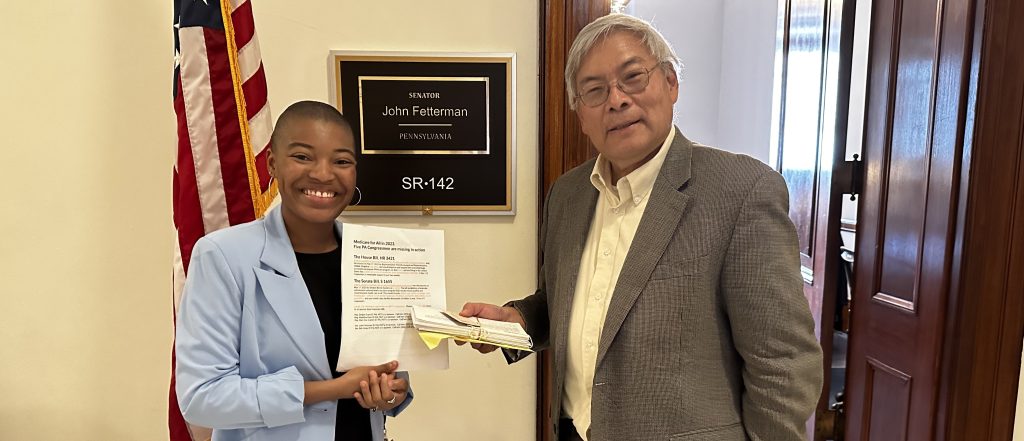
In Eastern Pennsylvania, chapter members visited Rep. Dwight Evans (D-PA) on the 58th anniversary of Medicare to ask him to cosponsor the Medicare for All bill. The chapter also met with state representative Arvind Venkat, who is also a physician from the Pittsburgh area, to discuss the possibility of proposing a state single-payer bill. On June 3, members gathered at Mt. Airy Day, a major community event in Philadelphia where they collected over 200 postcards for Congressional leaders to support a national single payer bill. These cards were hand-delivered to Senators Casey and Fetterman and Representatives Evans, Scanlon, Houlihan, Dean, and Boyle.
To get involved in Eastern Pennsylvania, please contact Dr. Walter Tsou at macman2@aol.com.
West Virginia
Our chapter in West Virginia continues to grow, and its website went live for the first time in March. Members have been holding regular monthly meetings with speakers on topics such as health care economics, social security, and updates from other state chapters. Efforts continue on membership recruitment at renewal at both state and national levels, as well as national phone banking efforts.
To get involved in West Virginia, please contact Dr. Daniel Doyle at doyledan348@gmail.com.
SNaHP Chapter Reports
Florida State University
SNaHP students at Florida State University have been busy recruiting new members, tabling at student events, and giving presentations. The chapter has also participated in advocacy efforts at the state level through their partnership with the recently consolidated Florida chapter of PNHP. Finally, the chapter has begun collaborating with the SNaHP chapter at the University of Florida, and both chapters are planning to host an event together in the coming year.
To get involved at Florida State University, please contact Xan Nowakowski at xnowakowski@fsu.edu.
Penn State
Students at Penn State have been working hard to prepare for the upcoming school year. The chapter has been working with their Hershey campus counterpart on goals of recruitment and becoming fixtures on their respective campuses. Some of their plans include strategizing around activities fairs, organizing a summer social event to stir conversation around single payer, and putting together a six-part fall seminar series to educate students on the health system and how they can work to fix it with Medicare for All.
To get involved at Penn State, please contact Andrew Meci at ameci@pennstatehealth.psu.edu.
University of Buffalo
At the University of Buffalo, SNaHP students tabled during orientation week for incoming M1 students and had many sign up to be a part of the organization. Members also attended a Community Health Fair at the local Hopewell Baptist Church hosted by the Student National Medical Association; they used this opportunity to go out in the community and educate their neighbors on PNHP’s mission and the benefits of a national healthcare system.
To get involved at the University of Buffalo, please contact Colin Marchincin at cmarchin@buffalo.edu.
University of Minnesota-Twin Cities
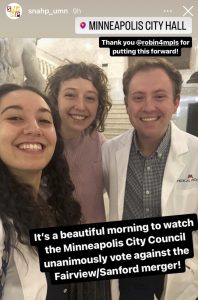
The SNaHP chapter at University of Minnesota-Twin Cities co-hosted a viewing and panel discussion of “American Hospitals,” along with Minnesota Nurses Association, PNHP MN, Health Care for all MN, SEIU MN, MN COPAL, and Arts and Medicine UMN. Members met with City Council member Robin Wonsley to request that the Minneapolis City Council create a resolution opposing the merger of hospital systems Fairview Health Services and Sanford Health. The resolution passed unanimously, and the merger was later canceled. Finally, five chapter members participated in PNHP MN’s summer internship program.
To get involved at the University of Minnesota Twin Cities, please contact Sonja Knudson at knuds155@umn.edu.
University of Missouri-Columbia
Students at the University of Missouri-Columbia’s SNaHP chapter organized a monthly repeating voter registration event at their community health clinic for uninsured patients. The chapter also organized a speaking event with PNHP Board Secretary Dr. Ed Weisbart, who spoke to students about reaching across the aisle on discussions around Medicare for All. Finally, members held an educational event for medical students to learn the basics on the Medicare and Medicaid programs.
To get involved at the University of Missouri-Columbia, please contact Lauren Nowakowski at Lmndn9@umsystem.edu.
35th Anniversary House Parties
PNHP National Coordinator Dr. Claudia Fegan and immediate past PNHP President Dr. Susan Rogers hosted a house party in Illinois which was attended by 15 people. Highlights included an engaged discussion on single payer, vegetarian hors d’oeuvres, and homemade sangria! Almost everyone who attended donated, and a lapsed member rejoined PNHP along with making a sizable donation. Drs. Fegan and Rogers also secured 7 new donors, had a new member join, and even inspired an attending couple to host their own event! From a goal of $2000, they raised over $2800.
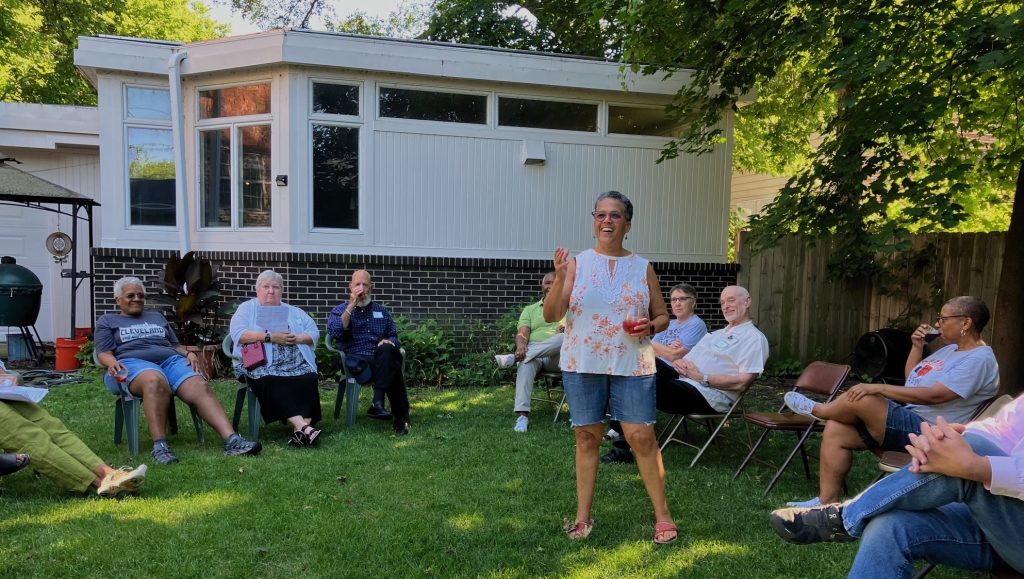
PNHP Board Member Dr. Eve Shapiro hosted a house party in Arizona along with a co-host. Dr. Shapiro invited people who she knew were interested in the issue of single payer, but not all of them were health professionals. Many invitees came from connections with the local Democratic Party and other progressive activists. Dr. Shapiro felt that having guests invite their own interested friends was key to hosting a successful event, as was encouraging discussion and providing plenty of food and drinks. From a goal of $3500, Dr. Shapiro raised over $4600.
Dr. Nancy Greep hosted a house party in California. She sent out invitations to friends, people who signed PNHP petitions, and neighbors. Dr. Greep invited SNaHP students who really livened up the party and were great at communicating about PNHP with guests. She also prepared a short PowerPoint presentation for guests, which helped to explain PNHP’s mission and what donations would be used for. Overall, Dr. Greep raised $2000.
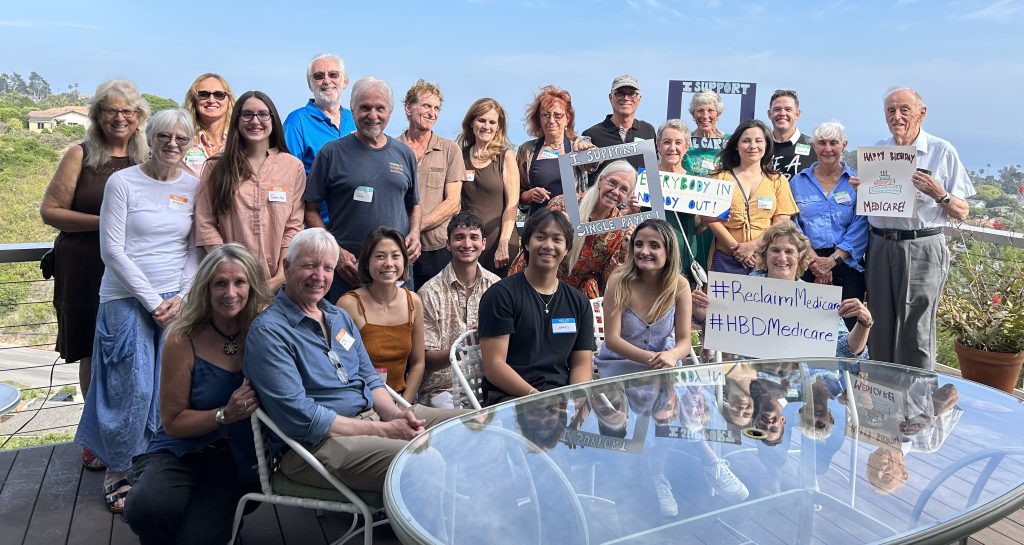
PNHP member Dr. Leo Alonso hosted a house party in Florida. He invited about 18 friends who shared like-minded views on health care. Dr. Alonso prepared PNHP goodies like stickers and pens, and included a QR code to make on-the-spot donations. After a dinner of homemade pizza and Cuban sandwiches, everyone gathered for a lively and cerebral discussion on Medicare for All, asking questions about how the program would work, common arguments against it, and related issues like fraud in Medicare Advantage.
Dr. Wayne Strouse hosted a house party in New York. Although some of the planned activities couldn’t be carried out due to weather and timing issues, the party was nonetheless successful. Dr. Strouse gave a talk about his experiences living and working in New Zealand, drawing on his experience with the single-payer health care system there to explain what PNHP was working toward in the U.S. The party successfully brought in new donors to PNHP, and raised $1300 on a $500 goal.
Dr. Jessica Schorr Saxe hosted a house party in North Carolina along with Dr. Susan Rucker and Dr. Andrea Desantis. They had food from countries with single-payer, and info by each food station on that country’s particular health system. About 35 people attended from a variety of backgrounds. The hosts spent a few minutes speaking about PNHP and the goals of the fundraising, and then gave a brief ask with the pitch of what PNHP is up against from the investment industry. Several new members and donors came out of the party, and hosts raised over $7600!
PNHP in the News
News items featuring PNHP members
- “Drug costs lead millions in the US to not take medications as prescribed, according to CDC,” CNN, 6/2/23, featuring Dr. Adam Gaffney
- “13 Things You Never Knew You Could Negotiate,” Women.com, 7/17/23, featuring Dr. David Himmelstein
- “Seattle crowd: ‘Medicare for All! Everybody in, nobody out!’,” People’s World, 8/15/23, featuring Bryce Walker
- “Maine Medical Association says American healthcare system needs an overhaul,” Maine Monitor, 9/11/23
- “Insurers Are Gaming Medicare–To The Tune Of $140 Billion,” The Lever, 10/4/23, featuring Dr. Ed Weisbart
- “Medicare Advantage Overbills Taxpayers by $140 Billion a Year—Enough to Wipe Out Medicare Premiums,” Common Dreams, 10/4/23, featuring Dr. Ed Weisbart
- “Physician group slams insurers for overcharging taxpayers for Medicare Advantage,” Medical Economics, 10/10/23
- “There is Too Much Medicare Marketing,” Kiplinger, 10/11/23
Op-eds by PNHP members
- “Health-care workers hamstrung by law denying care to some,” by Dr. A. Joseph Layon, Orlando Sentinel, 7/28/23
- “The Time Has Come for Medicare for All,” by F. Douglas Stephenson, LA Progressive, 7/29/23
- “Just buy it back already,” by Thomas Lane, Minnesota Reformer, 8/11/23
- “Single-payer health care will help solve many problems, not every problem,” by Dr. Samuel Metz, Bend Bulletin, 8/15/23
- “Inside the Big Business of Blood,” by Dr. Adam Gaffney, New Republic, 8/16/23
- “As We See It: SB 1089 establishes governance board to create universal health care plan,” by Dr. Mike Huntingon and Dr. Bruce Thomson, Corvallis Gazette-Times, 8/29/23
- “California Says No to Privatizing Medicare,” by Patty Harvey, North Coast Journal, 9/21/23
- “The Great Medicaid Unwinding,” by Dr. Adam Gaffney, The Nation, 10/6/23
- “Medicare (Dis)Advantage,” by Barry Hermanson, San Francisco Bay View, 10/22/23
- “Medicare Advantage plans may work well for you, until you get sick,” by Dr. Marvin Malek, VTDigger, 10/23/23
Letters to the editor by PNHP members
- “The problem with upcoding under Medicare Advantage,” by Dr. Julie Pease, Portland Press Herald, 8/1/23
- “Make health care work for all,” by Dr. Alan Unell, The Columbian, 9/4/23
- “Save on health care,” by Dr. Henry Abrons, San Francisco Chronicle, 9/7/23
- “Correct income inequality among doctors,” by Dr. George Bohmfalk, Washington Post, 9/8/23
- “We need a single-payer system in the US,” by Dr. Christine Ebert-Santos, Summit Daily, 9/12/23
- “Where do politicians stand on universal care?” by Patty Harvey, Times-Standard, 9/14/23
- “Health care for all,” by Dr. Walter Tsou, Philadelphia Inquirer, 9/26/23
- “Another Reason for Universal Healthcare,” by Dr. Joanne Mallett, Arizona Daily Star, 9/28/23
- “Seniors should avoid Medicare Advantage plans,” by Dr. Ann Troy, Marin Independent Journal, 10/7/23
- “Join Margo in support of ‘Medicare for All’,” by Dr. Michael Marek, Aspen Daily News, 10/9/23
- “Medicare for All our best solution,” by Dr. Tom Jenkins, Chattanooga Times Free Press, 10/14/23
- “Medicare Malady: A second opinion,” by Dr. Ann Troy, Pacific Sun, 10/17/23
- “Protect it,” by Dr. Christine Llewellyn, Virginian-Pilot, 10/20/23
- “It’s Medicare ‘DISadvantage’,” by Dr. Jeff Sklar, Riverdale Press, 10/20/23
- “Politics controls health policy from upstream,” by John Steen, VTDigger, 10/22/23